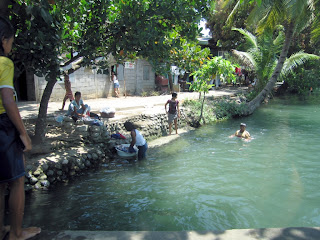
La Union is where half of my heritage lies. This is the place my father called home before he and Mom decided to raise their kids in the province of Bulacan in central Luzon. As a result my sisters and I never learned the language and the traditions of the north. I know my father still misses his hometown. But I, despite the occasional summers spent there as a kid, have only fragmented images of Sudipen, that town in La Union where Lola Bebeng and Lolo Caloy, his parents, spent most of their lives.
Lola Bebeng died April 26 at the ripe old age of 93, having outlived her husband by more than a decade. I flew home to pay my last respects, but could not stay for the funeral.
She had a harsh life. Coming from a landed family (the Amoyens had been well known in the district for many many years), she eloped with an adventurer and had seven children by him -- my Dad, Ariston the eldest; Carlito, who looks so much like his father; Ruben, with whose family my sisters lived in Baguio City during their college days at St Louis University; Nene, my aunt who lives in Hong Kong; Gloria, who married an American and has made Oregon her home for the past 13 years; Helen, who has four kids and lives in the family compound in Sudipen; and Romeo, who went into the Philippine army and died fighting rebels in Mindanao. In the early days money was hard to come by and she had to sell off her inheritance--land--parcel by parcel to support her children's education.
Her children have all made good, and helped make her old age more comfortable than her middle years. But this prosaic summary does not do justice to the grace, dignity and astonishing fortitude she showed in life. Lola Bebeng's history, the history and legacy of this side of my family--I still do not feel equal to writing about it adequately. I simply do not know enough; after all, I paid it no attention for decades. But I hope to one day soon find the words to honor and celebrate such a life well lived.
In the meantime, some pictures. In April, the Ilocos region--and much of the Philippines--bakes in 36 to 40 degree heat. High summer is the cruellest time. The air hardly moves, the fields are seared; animals look thirsty and take refuge in drying rivers; in many households water supplies run low.

But a tributary of the Amburayan river from the Mountain Province runs through Sudipen and the townspeople take full advantage of its cool clear waters to escape the summer heat.


When she was still strong, my lola would have bought these onions and garlic at the town market. Maybe the field snails too:


And she would cook on these clay stoves so typical of the region:

I found this interesting history of Sudipen. The town has undergone a number of political changes this century. It even used to be part of Mountain Province. There is much to learn and remember.
No comments:
Post a Comment